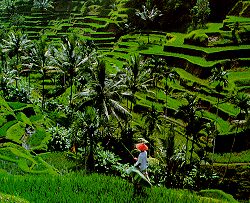Wittfogel, Karl Oriental Despotism. Yale U. Press 1957 pp. 11-100
This is the fourth in a series of notes to eleven lectures for my class Technology and Culture.
Fateful consequences of irrigated agriculture |
Not necessity but consequences (p.16)
- Today a focus on economic and political institutions triggered
by the development of irrigated agriculture and the deepening dependence
of larger and larger populations on it. Inevitable consequences, rationality,
imagination, and new consequences.
- A bit of history: Wittfogel starts with Marx and was later used
by a few anthropologists around Steward all interested in the evolution
of human society in general and, in this insistence, on the origin of the
earlier forms of the State, and possibly its evolution into the various
"modern" form of the State we have come to know (liberal democracy,
fascism, soviet socialism, etc.).
Because of the association with Marx and Steward, and because on the emphasis on ecology/technology first (rather than ideology) Wittfogel is mostly discussed within the context of "materialism" and determinism. But it does not have to be so. Furthermore, within the context of a discussion of technology, his kind of careful work on what it takes to use water for irrigating crops, and on the consequences of success in doing so, must be taken seriously.
- While most would probably interpret Wittfogel as proposing a sequence
of causes and effect, I will look at him in terms of a structural model of what is involved (p.
42):
- Hydraulic works
- Productive installations (canals, aqueducts, reservoirs, sluices, and dikes for the purpose of irrigation)
- Protective installations (drainage canals and dikes for flood control)
- Aqueducts providing drinking water
- Navigation canals
- Nonhydraulic works
- Works of defense and communication (walls and others structures of defense, highways)
- Edifices serving the public and personal needs of the secular and religious masters of hydraulic society: palaces and capital cities, tombs, temples)
 Wittfogel
worked mostly in China, and quotes other "hydraulic societies"
as found in India, Mesopotamia, Pre-Columbian America, etc. Let's look briefly
at one case study to understand further necessities, possibilities, and
consequences: rice farming on terraces in Bali, particularly the problem
of the sequencing of access to water in terraces on the same water shed.
The construction of the terraces and irrigation canals is only the beginning
given the possibilities and exigencies of using and reusing water.
Wittfogel
worked mostly in China, and quotes other "hydraulic societies"
as found in India, Mesopotamia, Pre-Columbian America, etc. Let's look briefly
at one case study to understand further necessities, possibilities, and
consequences: rice farming on terraces in Bali, particularly the problem
of the sequencing of access to water in terraces on the same water shed.
The construction of the terraces and irrigation canals is only the beginning
given the possibilities and exigencies of using and reusing water.
- as water goes down a mountain side, it can be reused several time if the weather is such that crops can be planted all year around
- then the problem is insuring that water enters the terrace when needed and moves out of the terrace at the appointed time
- solutions were found in Bali through a complex system of religious rituals that has been better at managing water distribution than either the colonial or World Bank experts.
- The nature of the Balinese states, their relationship to Java and then the Dutch colonialists and then Indonesia (Geertz on Bali as a "theatre state")
- The dangers of the introduction of new strains of rice.
However rice is also grown in societies somewhat distant from State control, and not necessarily for the obvious nutritional reasons. (See an introduction to rice farming from Conklin's work in Ifugao)
- How does this apply to the States that have emerged with industrialization?
- Wittfogel and the reproduction of oriental despotism in the Soviet Union and Maoist China.
- The power implications of industrialization:
- American liberal capitalism (weak state, strong corporations, the power of management)
- European socialism (strong state, weak corporations, the power of bureaucratic elites)
- fascism, soviet, Indonesia...
- But there are also interesting implications in Wittfogel's analysis of
the division of labor fostered by hydraulic societies, and his discussion
of class.
- Thus we can consider the internal differentiation in cultural ecology
for people in the various classes. Considering differential access of
power and resources does not tell us much about possibilities and consequences
in any of the positions
- poverty in the U.S. productive possibilities (menial jobs, welfare, "illegal" trading) and social consequences (larger and internally differentiated groups)
- prosperity ... (education, networking, mobility) ... (smaller and less differentiated groups).
- Thus we can consider the internal differentiation in cultural ecology
for people in the various classes. Considering differential access of
power and resources does not tell us much about possibilities and consequences
in any of the positions
To all this has to be added everything he writes about the development of bureaucracy and its prerequisites and consequences (e.g. literacy, specialization in art and religion, etc.)
I read this as a guide for research since the exact way any of this is done varies significantly: the regulation of irrigation schedules through temple worship in Bali vs. European administrators and engineers.
| Some questions in the context of this lesson If you want to respond to these you can do so by posting comments through the page for this lesson on StudyPlace |
|---|
|